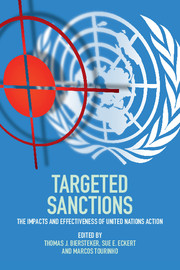Book contents
- Frontmatter
- Contents
- List of figures
- List of tables
- List of contributors
- List of abbreviations
- Introduction
- 1 Thinking about United Nations targeted sanctions
- 2 The purposes of targeted sanctions
- 3 Security Council dynamics and sanctions design
- 4 United Nations targeted sanctions and other policy tools: diplomacy, legal, use of force
- 5 The relationship between United Nations sanctions and regional sanctions regimes
- 6 Coordination of United Nations sanctions with other actors and instruments
- 7 Implementation of United Nations targeted sanctions
- 8 The impacts of United Nations targeted sanctions
- 9 The unintended consequences of United Nations targeted sanctions
- 10 The effectiveness of United Nations targeted sanctions
- 11 Institutional learning in targeting sanctions
- 12 Conclusion
- Appendix 1 List of cases and episodes
- Appendix 2 Sanctions effectiveness
- Appendix 3 TSC database codebook
- Appendix 4 Targeted Sanctions Consortium (TSC) participants
- Bibliography
- Index
11 - Institutional learning in targeting sanctions
Published online by Cambridge University Press: 05 March 2016
- Frontmatter
- Contents
- List of figures
- List of tables
- List of contributors
- List of abbreviations
- Introduction
- 1 Thinking about United Nations targeted sanctions
- 2 The purposes of targeted sanctions
- 3 Security Council dynamics and sanctions design
- 4 United Nations targeted sanctions and other policy tools: diplomacy, legal, use of force
- 5 The relationship between United Nations sanctions and regional sanctions regimes
- 6 Coordination of United Nations sanctions with other actors and instruments
- 7 Implementation of United Nations targeted sanctions
- 8 The impacts of United Nations targeted sanctions
- 9 The unintended consequences of United Nations targeted sanctions
- 10 The effectiveness of United Nations targeted sanctions
- 11 Institutional learning in targeting sanctions
- 12 Conclusion
- Appendix 1 List of cases and episodes
- Appendix 2 Sanctions effectiveness
- Appendix 3 TSC database codebook
- Appendix 4 Targeted Sanctions Consortium (TSC) participants
- Bibliography
- Index
Summary
Departing from the new TSC data on sanctions episodes, this chapter explores institutional learning in the use of UN targeted sanctions. Thus, lessons can be based on experiences accumulated since the early 1990s. Although there is an increase of sanctions regimes regionally, as well as by national governments, the UN remains the most legitimate international body for sanctions action universally, and hence it is the focus of the chapter.
First, it is important to note how the sanctions debate has changed over the years, and how this results in new types of sanctions. The discussion has moved from the issue of automatic sanctions to counter aggression in the 1930s, to their use in the Cold War for furthering decolonization, to the hope of building a new post–Cold War order without civil wars, with fewer nuclear weapons states, and less terrorism, all to be achieved increasingly with targeted sanctions.
Interestingly, there are now some typical differences in the aims of various sanctions senders. The contrast between the EU and the UN is particularly noteworthy, where the former focuses more on the conditions for democracy and human rights, while the latter concentrates on peace and security. The African Union has also become an important international actor in sanctions, particularly for upholding constitutional rights in African countries and thus actively signalling that military and political coups (unconstitutional changes of government) are unacceptable. (See Chapter 5 for a detailed discussion of variations in regional sanctions regimes.)
Thus, there is a proliferation of international actors using sanctions, which makes the question of sanctions effectiveness highly pertinent. There are, furthermore, several reasons to expect improvement in the sanctions record, as the sanctions debate has been vigorous, notably in relation to the Iraq sanctions and their observed humanitarian impact. It is equally reasonable to anticipate an impact of the three major efforts at reforming sanctions: the Interlaken, Bonn-Berlin, and Stockholm processes. There have been definite changes in the procedures of the UN Secretariat to improve sanctions implementation, in particular in administering more targeted sanctions measures. Today there are no comprehensive UN sanctions. Other senders of sanctions may, however, have applied more general measures, notably the recent EU and US sanctions on Iran, that affect the entire economy of the target.
Information
- Type
- Chapter
- Information
- Targeted SanctionsThe Impacts and Effectiveness of United Nations Action, pp. 248 - 264Publisher: Cambridge University PressPrint publication year: 2016
Accessibility standard: Unknown
Why this information is here
This section outlines the accessibility features of this content - including support for screen readers, full keyboard navigation and high-contrast display options. This may not be relevant for you.Accessibility Information
- 3
- Cited by
